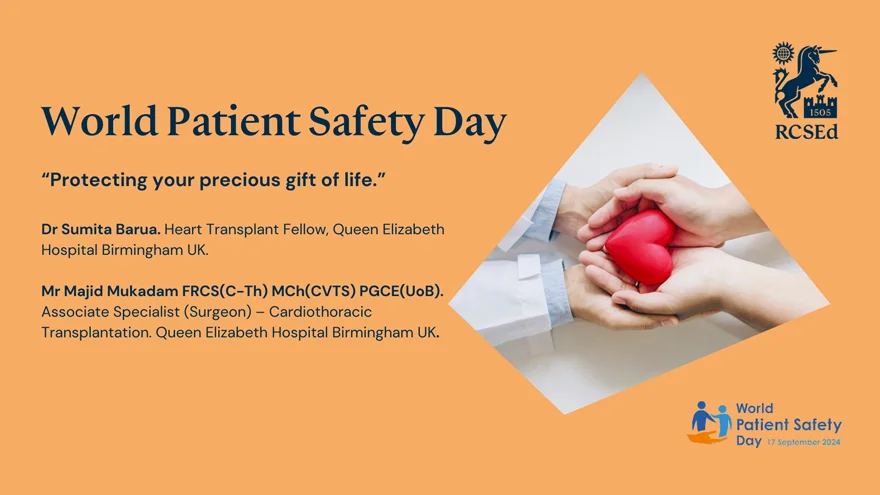
The Patient Safety Group (PSG) of the Royal College of Surgeons of Edinburgh (RCSEd) are delighted to lend our enthusiastic support to the sixth World Patient Safety Day (WPSD). This event, established by the World Health Organisation (WHO) in 2019, takes place on 17 September every year. It helps to raise global awareness amongst all stakeholders about key Patient Safety issues and foster collaboration between patients, health care workers, health care leaders and policy makers to improve patient safety. Each year a new theme is selected to highlight a priority patient safety area for action.
The theme set by the WHO for this year’s WPSD is “Improving diagnosis for patient safety”, recognising the vital importance of correct and timely diagnosis in ensuring patient safety and improving health outcomes.
A heart transplant is one of the greatest gifts a patient with end-stage heart failure can receive. This gift from the organ donor is probably the highest act of charity, saving precious life by their singular selfless action. It is imperative to look after this gift and reap benefit from this act of generosity for as long as possible. One of the most dreaded complications of heart transplantation is rejection, however in the vast majority of cases, it is highly treatable with no long-term impact on longevity. All patients who have had a heart transplant will be commenced on strong immunosuppression medications to prevent rejection immediately following their surgery. With time, the risk of rejection reduces, allowing the strength, and sometimes the number of medications used to prevent rejection to be reduced over time. In the modern era of heart transplantation, the risk of rejection in the first year is approximately 25%, the majority of which can be managed in the outpatient setting. In fact, most cases are detected on routine heart biopsy, with a set schedule of biopsies performed in the first year at most transplant centres around the world to detect rejection before symptoms, or significant damage to the transplant heart occur. Rejection beyond the first year is rare as long as patients are taking their anti-rejection medications appropriately.
Early symptoms of rejection reflect the body’s inflammatory response. These are vague, mimicking any infection, such as tiredness, fever, and body aches. As the rejection episode progresses, you may start to develop “heart failure” symptoms, such as shortness of breath on walking or lying flat, using more pillows to sleep, or swelling around your ankles. Finally, rejection episodes can also result in abnormal heart rhythms, so you may experience fast palpitations or fainting episodes. If you are experiencing any of these symptoms, you should reach out to your transplant centre, so they can arrange prompt investigations to assess for rejection. This will include a consultation to assess signs and symptoms of heart failure, an ECG (electrical trace of the heart) to look for any abnormal heart rhythms, a transthoracic echocardiogram (heart ultrasound) to assess the heart’s function, blood tests to look for any antibodies you may have developed against the transplant heart and most importantly, a heart biopsy to look for damage to the heart muscle cells to diagnose rejection.
Most rejection episodes will be treated with a higher dose of oral steroids for a few days, thus do not require hospital admission, with a repeat biopsy performed a week later to ensure the rejection episode has cleared. For more severe episodes, or where the rejection episode hasn’t cleared after the initial course of treatment, you will need to be admitted for intravenous steroids. Depending on the type of rejection, you may also require additional treatments such as anti-thymocyte globulin (ATG) or plasma exchange. With prompt treatment, the heart function will usually remain normal throughout the rejection episode, or even if transiently reduced, will recover back to normal.
The most important thing to reduce the risk of rejection is to take your anti-rejection medications every single day as prescribed, and to regularly have the levels checked at your scheduled appointments to ensure they remain within target. This also means ensuring you always have adequate stock of your medications and ordering repeat prescriptions well ahead of time.
Written by:
Dr Sumita Barua, Heart Transplant Fellow, Queen Elizabeth Hospital Birmingham UK
Mr Majid Mukadam, FRCS(C-Th) MCh(CVTS) PGCE(UoB). Associate Specialist (Surgeon) – Cardiothoracic Transplantation. Queen Elizabeth Hospital Birmingham UK

